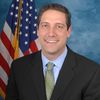Shane Hoffman
Shane Hoffman (independent) ran for election to the U.S. Senate to represent Ohio. He lost as a write-in in the general election on November 8, 2022.
Biography
Shane Hoffman was born in Decatur, Indiana. He obtained a bachelor's degree from the University of Dayton in 1996 and a master's degree from Indiana University, Indianapolis, in 2000. His professional experience includes working in a variety of roles in libraries, including as a technology consultant for libraries. He also worked as a technology consultant for small businesses. As of 2020, Hoffman was a technology services manager for the Plain City Public Library.[1]
Elections
2022
See also: United States Senate election in Ohio, 2022
General election
General election for U.S. Senate Ohio
The following candidates ran in the general election for U.S. Senate Ohio on November 8, 2022.
Candidate | % | Votes | ||
| ✔ |  | J.D. Vance (R) | 53.0 | 2,192,114 |
 | Tim Ryan (D) | 46.9 | 1,939,489 | |
 | John Cheng (Independent) (Write-in)  | 0.0 | 702 | |
 | Shane Hoffman (Independent) (Write-in) | 0.0 | 403 | |
 | LaShondra Tinsley (Independent) (Write-in) | 0.0 | 362 | |
 | Stephen Faris (Independent) (Write-in) | 0.0 | 194 | |
| Matthew Esh (Independent) (Write-in) | 0.0 | 78 | ||
| Total votes: 4,133,342 | ||||
 = candidate completed the Ballotpedia Candidate Connection survey. = candidate completed the Ballotpedia Candidate Connection survey. | ||||
| If you are a candidate and would like to tell readers and voters more about why they should vote for you, complete the Ballotpedia Candidate Connection Survey. | ||||
Do you want a spreadsheet of this type of data? Contact our sales team. | ||||
Withdrawn or disqualified candidates
- Shawn Mousourakis (Independent)
- Chad Taylor (Independent)
- Eric Meiring (Independent)
- Samuel Ronan (Independent)
- Dominic LaCavera (Independent)
- Shannon Taylor (Independent)
- Kelli Prather (Independent)
Democratic primary election
Democratic primary for U.S. Senate Ohio
Tim Ryan defeated Morgan Harper and Traci Johnson in the Democratic primary for U.S. Senate Ohio on May 3, 2022.
Candidate | % | Votes | ||
| ✔ |  | Tim Ryan | 69.6 | 359,941 |
 | Morgan Harper  | 17.8 | 92,347 | |
 | Traci Johnson  | 12.6 | 65,209 | |
| Total votes: 517,497 | ||||
 = candidate completed the Ballotpedia Candidate Connection survey. = candidate completed the Ballotpedia Candidate Connection survey. | ||||
| If you are a candidate and would like to tell readers and voters more about why they should vote for you, complete the Ballotpedia Candidate Connection Survey. | ||||
Do you want a spreadsheet of this type of data? Contact our sales team. | ||||
Withdrawn or disqualified candidates
- Tamie Wilson (D)
- LaShondra Tinsley (D)
- Rick Taylor (D)
- Demar Sheffey (D)
Republican primary election
Republican primary for U.S. Senate Ohio
The following candidates ran in the Republican primary for U.S. Senate Ohio on May 3, 2022.
Candidate | % | Votes | ||
| ✔ |  | J.D. Vance | 32.2 | 344,736 |
 | Josh Mandel | 23.9 | 255,854 | |
 | Matt Dolan | 23.3 | 249,239 | |
 | Mike Gibbons | 11.7 | 124,653 | |
 | Jane Timken | 5.9 | 62,779 | |
Mark Pukita  | 2.1 | 22,692 | ||
 | Neil Patel  | 0.9 | 9,873 | |
| Total votes: 1,069,826 | ||||
 = candidate completed the Ballotpedia Candidate Connection survey. = candidate completed the Ballotpedia Candidate Connection survey. | ||||
| If you are a candidate and would like to tell readers and voters more about why they should vote for you, complete the Ballotpedia Candidate Connection Survey. | ||||
Do you want a spreadsheet of this type of data? Contact our sales team. | ||||
Withdrawn or disqualified candidates
- Zachary Musick (R)
- Mackenzie Thompson (R)
- Michael Leipold (R)
- Bernie Moreno (R)
- John Berman (R)
- John Reed (R)
- Bill Graham (R)
2020
See also: Ohio's 15th Congressional District election, 2020
Ohio's 15th Congressional District election, 2020 (April 28 Republican primary)
Ohio's 15th Congressional District election, 2020 (April 28 Democratic primary)
General election
General election for U.S. House Ohio District 15
Incumbent Steve Stivers defeated Joel Newby and Shane Hoffman in the general election for U.S. House Ohio District 15 on November 3, 2020.
Candidate | % | Votes | ||
| ✔ |  | Steve Stivers (R) | 63.4 | 243,103 |
 | Joel Newby (D)  | 36.6 | 140,183 | |
 | Shane Hoffman (American Solidarity Party) (Write-in)  | 0.0 | 75 | |
| Total votes: 383,361 | ||||
 = candidate completed the Ballotpedia Candidate Connection survey. = candidate completed the Ballotpedia Candidate Connection survey. | ||||
| If you are a candidate and would like to tell readers and voters more about why they should vote for you, complete the Ballotpedia Candidate Connection Survey. | ||||
Do you want a spreadsheet of this type of data? Contact our sales team. | ||||
Democratic primary election
Democratic primary for U.S. House Ohio District 15
Joel Newby defeated Daniel Kilgore in the Democratic primary for U.S. House Ohio District 15 on April 28, 2020.
Candidate | % | Votes | ||
| ✔ |  | Joel Newby  | 65.6 | 28,503 |
 | Daniel Kilgore  | 34.4 | 14,916 | |
| Total votes: 43,419 | ||||
 = candidate completed the Ballotpedia Candidate Connection survey. = candidate completed the Ballotpedia Candidate Connection survey. | ||||
| If you are a candidate and would like to tell readers and voters more about why they should vote for you, complete the Ballotpedia Candidate Connection Survey. | ||||
Do you want a spreadsheet of this type of data? Contact our sales team. | ||||
Republican primary election
Republican primary for U.S. House Ohio District 15
Incumbent Steve Stivers defeated Shelby Hunt in the Republican primary for U.S. House Ohio District 15 on April 28, 2020.
Candidate | % | Votes | ||
| ✔ |  | Steve Stivers | 88.1 | 41,749 |
 | Shelby Hunt  | 11.9 | 5,627 | |
| Total votes: 47,376 | ||||
 = candidate completed the Ballotpedia Candidate Connection survey. = candidate completed the Ballotpedia Candidate Connection survey. | ||||
| If you are a candidate and would like to tell readers and voters more about why they should vote for you, complete the Ballotpedia Candidate Connection Survey. | ||||
Do you want a spreadsheet of this type of data? Contact our sales team. | ||||
Campaign themes
2022
Ballotpedia survey responses
See also: Ballotpedia's Candidate Connection
Shane Hoffman did not complete Ballotpedia's 2022 Candidate Connection survey.
2020
Shane Hoffman completed Ballotpedia's Candidate Connection survey in 2020. The survey questions appear in bold and are followed by Hoffman's responses.
| Collapse all
- Our economy, the key to every aspect of our daily lives, is broken. The economic polices of both parties over the last fifty years have failed. Both parties have subscribed to economic theories that ignore the human component. Economics are meant to serve the people, not wedge the people in at its feet as cogs to be used and discarded as necessary. We have the means at our disposal to re-design the economy by utilizing available structures to empower the employee while leaving reasonable profits to the risk takers. We don't have to resort to socialism to fix the economy, but we need someone who will fight for and encourage these changes.
- No one should ever, ever have to work multiple jobs and still not afford a safe, warm place to live, decent food and health care. While we are recreating the economy to account for the humanity it currently ignores, we must maintain and expand the safety net. It is currently designed almost like a trap instead of a springboard back into full and independent participation.
- Healthcare is a national emergency, and should be treated as such. The President made some good starts, with pricing transparency, but there is much more that should be done. Medical patents should be ended and replaces by longer term licensing agreements. American citizens already pay well over half the costs of drug research through taxes and charitable giving, why should they be held hostage to monopolistic pricing and be denied the drugs they've funded? Vertical integration of hospitals, insurance companies and pharmaceutical companies must stop as well. We can significantly reduce prices this way.
Robert F Kennedy and his work fighting poverty has been inspiring. I haven't read a lot about it as of yet, but what I have read is amazing. A lot of the ground we're treading today is only there because of the work of Kennedy, a man whose privileged upbringing could easily have made him an opponent of or at the least oblivious to the these initiatives. Instead, he took great personal risks and invested significant amounts of energy and time making things happen.
Dorothy Day and Peter Maurin of the Catholic Worker Movement were tireless in their efforts to fight for human dignity. They eschewed many comforts and took many risks to fight for labor and relief from poverty. They created, largely from scratch, the roots of the modern day soup kitchen, hostel and many other emergency relief systems we use today. It was certainly at a time when this was not looked upon kindly in many circles.
1. An Economics of Justice & Charity by Thomas Storck.
2. Goliath: The 100 Year War Between Democracy and Monopoly Power by Matt Stoller
3. Toward a Truly Free Market by John Medaille
Other works:
Lives of Moral Leadership by Rober Coles
An upcoming read that I am looking forward to: Beyond the Abortion Wars: A Way Forward for a New Generation by Charles C. Camosy
If you need some music:
Are you Ready? and other songs off Evolution from Distrubed
Another solution for redistricting would be larger, multiple winner districts and/or Ranked Choice Voting. Imagine what we could do for representation with a few more representatives and these new options.
1. Gerrymandering reform will help curtail the ever increasing "extreme" candidates. The "safer" a district is for one party or another, the more extreme the ideology from that party will become.
2. We relieve restrictions that unfairly keep third parties out of the political process.
I am not in favor of term limits for the Supreme Court. Judges at that level should never have to consider life after their tenure.
Note: Ballotpedia reserves the right to edit Candidate Connection survey responses. Any edits made by Ballotpedia will be clearly marked with [brackets] for the public. If the candidate disagrees with an edit, he or she may request the full removal of the survey response from Ballotpedia.org. Ballotpedia does not edit or correct typographical errors unless the candidate's campaign requests it.
See also
2022 Elections
External links
Footnotes
- ↑ Information submitted to Ballotpedia through the Candidate Connection survey on October 1, 2020









